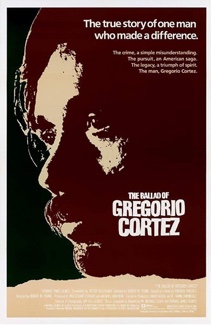| The Ballad of Gregorio Cortez | |
|---|---|
 Theatrical release poster | |
| Directed by | Robert M. Young |
| Screenplay by |
|
| Based on | With His Pistol in His Hand by Américo Paredes |
| Produced by |
|
| Starring | Edward James Olmos |
| Cinematography | Reynaldo Villalobos |
| Edited by |
|
| Music by |
|
Production companies |
|
| Distributed by | Embassy Pictures |
Release dates |
|
Running time | 106 minutes |
| Country | United States |
| Languages | English Spanish |
| Box office | $804,963 [1] |
The Ballad of Gregorio Cortez is a 1982 American Western crime film directed by Robert M. Young [2] and starring Edward James Olmos as Gregorio Cortez. [3] It is based on the 1958 book With His Pistol in His Hand by Americo Paredes. [4]
Contents
In 2022, the film was selected for preservation in the United States National Film Registry by the Library of Congress as being "culturally, historically or aesthetically significant." [5] [6]